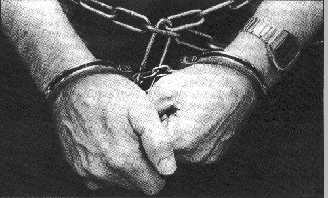
Justice or Profit?
The notion of private prisons as more efficient than public run facilties has an appealing quality to state legislatures and other law makers. But is this a true supposition or a flimsy assumption?
The argument that privatizing our prisions is an advantage to the tax payer has been disuputed by the very government that advocates for it.
According to the U.S. Government Accounting Office, the economic difference between operating a private penal facility and a public one is very small. Therefore, the very existence of private prisons raises an ethical issue:
What are the implications of basing the operation of a prison on a purely profit motivation?
Private prisons are a relatively new phenomenon. They began to appear a little more than twenty years ago, but have rapidly proliferated throughout much of the United States. Their upward surge is the result of ongoing "tough-on-crime policies" that have swollen the population of incarcerated men and women to the near two million mark. Once private prisons are built, states pay the firms to operate them—the two giants are the Wackenhut Corporation and the Corrections Corporation of America (CCA). It is to the advantage of these companies, and a few others, to keep the prison beds filled. For example, CCA has been a corporate member and a major contributor to ALEC (an influential conservative think tank) and an active member of its Criminal Justice Task Force.
As a result, the task force has modeled bills which , ALEC claims credit the widespread adoption of Truth in Sentencing and Three Strikes/Habitual Offender legislation. It's no wonder, with such lobbying power, that since the inception of private prisions we have seen an explosion in prison population. In 1970, there were approximately 300,000 people in prison and jail in the U.S.; by 2000, that number had grown by over 500% to nearly two million, or 25% of the world’s prison population in a nation that holds just 5% of the world’s people. Along with that enormous growth, we have seen sharp increases in racial disparities, in the number of women and youth behind bars, and in the proportion of people behind bars for non-violent (especially drug) offenses. African-Americans now make up 47% of state and Federal prison populations, but just 12% of the general population. Latinos make up at least an additional 16% of the prison population (not all states count Latinos separately from whites).
Consequently, critics of private prisons have increasingly challenged their use. Marc Mauer, assistant director of the non-profit Sentencing Project in Washington, D.C., maintains that private prision actually create an incentive for legislators to promote prison expansion because, “with private corporations building the facilities at their own expense—legislators can bypass having to go to voters for the approval of bond issues to obtain the needed construction funds. As an added incentive for their construction and use, many rural areas struggling with high unemployment rates clamor for prisons, public or private, because they mean jobs; and local legislators are often anxious to gratify these wishes—whether or not another facility is needed”. “By the late 1990s, about forty states had passed versions of truth-in sentencing similar to ALEC's model bill. Because of truth-in-sentencing and other tough sentencing measures, state prison populations grew by half a a million inmates in the 1990s even while crime rates fell dramatically. The result: more demand for private prison companies like CCA” (Source)
Therefore it is not a coincidence that prison population has exploded since we have allowed privitazation of our criminal system. The prisons populations will continue to expand as long as we allow our legislatures to use our tax dollars to line the pockes of CCA and Wackenhut executives.
This is a system that survives because of our apathy and it feeds on ignorance and greed.
Contact Congress now, only you can stop this feeble, half-baked corrections model.





4 Comments:
This is a very interesting argument. Personally, I don't mind the idea of having privately run prisons. One big problem with Government jobs is that it can become very hard to fire someone, even if they deserve it. Government jobs come along with these "can't touch me or the world will come down on your head situations."
As for your numbers with % of population US-world US-jailed. I would say we also have a very different justice system than much of the world. (No I am not saying it is perfect, etc.) But I would worry about going with the idea that we jail more than others might be because we take our laws more seriously than other countries take theirs. In addition, it could mean our legal system is less corrupt. In Mexico there are plenty of people that should be in jail, but thanks to the corrupt system they are never arrested... much less taken to trial or jailed.
Also, don't forget that many countries around the world do not keep the type of records and statistics we do. Many places have people jailed without a trial and are not listed in neat order. Think about the old gulags. You think China issues correct numbers on how many people they jail?
Since I disagree with you my only suggestion is to stick with the idea that they do not save as much money as many would believe, etc. Leave the statistics comparing the US to the rest of the world out of it. I think you have a more compelling case that way.
The laws that we choose to prosecute are selective. There are too many in our prisons who are there on minor drug infractions. Thanks to three strikes, which was lobbied by CCA and Wackenhut - conflict of interest? I think so.
Our prisons are full of drug addicts, who should be in treatment, not jail.
But the private prisons need to keep the beds filled. The profit motive is discusting in this case.
I am not in full agreement with you, because I think if you break the law by doing drugs or even low-level distribution you should be in jail.
So I ask you this. What if laws were changed to work for drug rehab in place of jail for many cases. BUT, the drug rehab facilities were to be privately run?
MD - I don't think that corporations, whose sole purpose to is to make money, should be pretending to serve the common good. So, to me it doesn't matter if they are for profit prisons or for profit drug rehabs, they should be creating laws which benefit their own bottom line.
If they are for profit, then clinics or prisons should recieve not public money.
No doubt that there should be some private clinics for drug rehab, but for those who cannot afford that, there should be clinic funded by the public, instead of prison.
At any rate sick people do not belong in jail, at least in most cases.
Post a Comment
<< Home